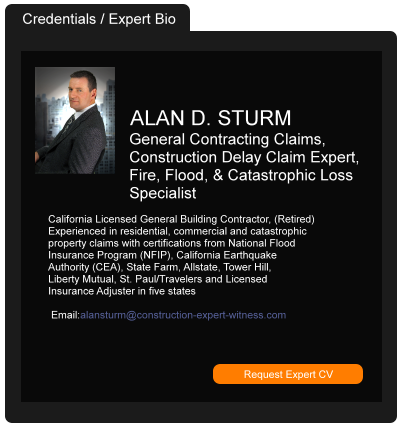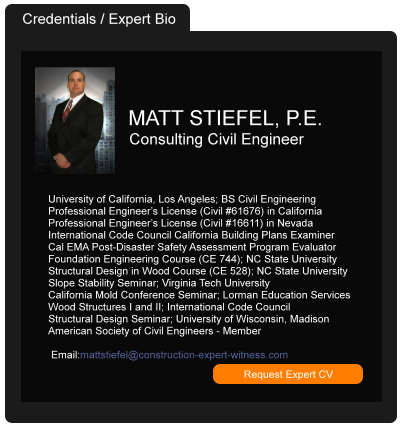Insurer’s Discovery Requests Ruled to be Overbroad in Construction Defect Suit
October 28, 2011 —
CDJ STAFFThe US District Court has ruled in the case of D.R. Horton Los Angeles Holding Co. Inc. v. American Safety Indemnity, Co. D.R. Horton was involved in a real estate development project. Its subcontractor, Ebensteiner Co., was insured by ASIC and named D.R. Horton as an additional insured and third-party beneficiary. D.R. Horton, in response to legal complaints and cross-complaints, filed for coverage from ASIC under the Ebensteiner policy. This was refused by ASIC. ASIC claimed that “there is no potential coverage for Ebensteiner as a Named Insurer and/or D.R. Horton as an Additional Insured.” They stated that “the requirements for coverage are not satisfied.”
The case same to trial with the deadline for discovery set at March 1, 2011. ASIC stated they were seeking the developer’s “job file” for the Canyon Gate project. D.R. Horton claimed that ASIC’s discovery request was overbroad and that it would be “unduly burdensome for it to produce all documents responsive to the overbroad requests.”
D.R. Horton did agree to produce several categories of documents, which included:
“(1) final building inspection sign-offs for the homes that are the subject of the underlying litigation;(2) an updated homeowner matrix for the underlying actions; (3) the concrete subcontractor files; (4) the daily field logs for D.R. Horton’s on-site employee during Ebensteiner’s work; (5) documents relating to concrete work, including documents for concrete suppliers; (6) documents relating to compacting testing; (7) documents relating to grading; and (8) D.R. Horton’s request for proposal for grading”
The court found that the requests from ASIC were overbroad, noting that the language of the ASIC Request for Production of Documents (RFP) 3-5 would include “subcontractor files for plumbing, electric, flooring, etc. - none of these being at issue in the case.” The court denied the ASIC’s motion to compel further documents.
The court also found fault with ASIC’s RFPs 6 and 7. Here, D.R. Horton claimed the language was written so broadly it would require the production of sales information and, again, subcontractors not relevant to the case.
Further, the court found that RFPs 8, 10, 11, and 13 were also overbroad. RFP 8 covered all subcontractors. D.R. Horton replied that they had earlier complied with the documents covered in RFPs 10 and 11. The court concurred. RFP 13 was denied as it went beyond the scope of admissible evidence, even including attorney-client communication.
The court denied all of ASIC’s attempts to compel further discovery.
Read the court’s decision…
Read the court decisionRead the full story...Reprinted courtesy of
Waiving The Right to Arbitrate Under Federal Law
November 08, 2021 —
David Adelstein - Florida Construction Legal UpdatesIf there is an arbitration provision in your contract that you want to enforce, you do not want to take action inconsistent with those rights as this could give rise to a waiver argument, i.e., that you waived your rights to arbitrate, particularly if the other party has been prejudiced.
Under federal policy and law, establishing waiver requires the party arguing waiver to “bear a heavy burden of proof.” U.S. f/u/b/o John Wayne Construction, G.S.A. Division, LLC v. Federal Ins. Co., 2021 WL 4526727 (M.D.Fla. 2021) quoting Stone v. E.F. Hutton & Co., 898 F.2d 1542, 1543 (11th Cir. 1990).
“To determine whether the right to arbitrate has been waived, courts apply a two part test: i) whether, “‘under the totality of the circumstances,’ the party ‘has acted inconsistently with the arbitration right’”; and ii) “whether, by doing so, that party ‘has in some way prejudiced the other party.’” Id. quoting Ivax Corp. V. B. Braun of Am., Inc., 286 F.3d 1309, 1315-16 (11th Cir. 2002). Substantial participation in litigation prior to invoking the right to arbitrate supports a party acting inconsistent with the right to arbitrate. Id. And, “‘[p]rejudice has been found in situations where the party seeking arbitration allows the opposing party to undergo the types of litigation expenses that arbitration was designed to alleviate.’” Id. quoting Morewitz v. W. of Eng. Ship Owners Mut. Prot. & Indem. Ass’n (Luxembourg), 62 F.3d 1356, 1366 (11th Cir. 1995).
Hence the heavy burden for a party to support to prove waiver– establishing both substantial participation in litigation that is inconsistent with the right to arbitrate AND prejudice.
Read the court decisionRead the full story...Reprinted courtesy of
David Adelstein, Kirwin Norris, P.A.Mr. Adelstein may be contacted at
dma@kirwinnorris.com
Domtar Update
June 11, 2014 —
Robert M. Caplan – White and Williams LLPOn May 29, 2014, the Pennsylvania Supreme Court granted allocatur—i.e., the permission to appeal—in the controversial subrogation case, Liberty Mutual Ins. Co. v. Domtar Paper Co., 77 A.3d 1282 (Pa. Super. Ct. 2013). In its order granting the relief to Liberty Mutual, a workers’ compensation insurer, the Supreme Court set forth the narrow issue to be decided on appeal: “Does Section 319 of the Pennsylvania Workers’ Compensation Act, 77 P.S. § 671, allow the employer/insurer to step into the shoes of the insured employee to subrogate against the tortfeasor?”
In Domtar, Liberty Mutual was caused to incur approximately $35,000 in compensation benefits which it paid on behalf of George Lawrence, an employee of Liberty Mutual’s insured, for injuries he sustained in a work-related accident. Mr. Lawrence chose not to file an independent personal injury lawsuit. As a result, in order to recover its lien interests, Liberty Mutual sued the third parties responsible for causing Mr. Lawrence’s work-related injuries directly, having become subrogated to the rights of Mr. Lawrence by virtue of Liberty Mutual’s workers’ compensation expenditure on his behalf.
Read the court decisionRead the full story...Reprinted courtesy of
Robert M. Caplan, White and Williams LLPMr. Caplan may be contacted at
caplanr@whiteandwilliams.com
Warren Renews Criticism of Private Equity’s Role in Housing
February 01, 2022 —
Akayla Gardner - BloombergSenator Elizabeth Warren is doubling down on her criticism of private equity’s involvement in the U.S. housing market as the nation grapples with an affordable-housing shortage.
In letters sent Thursday, the Massachusetts Democrat asked housing firms Progress Residential LLC, Invitation Homes Inc. and American Homes 4 Rent about recent rent hikes, plans to acquire more properties and the number of evictions in recent years.
Warren and other Democrats have scrutinized Wall Street’s role in the housing market since the 2008 financial crisis. During the pandemic, lawmakers have been on high alert for violations of eviction moratoriums and unfair treatment as Americans struggled financially to stay on their feet.
Warren also expressed concern about automated homebuying practices, which allow companies to buy up properties using algorithms. Bloomberg reported that last year Zillow offloaded thousands of homes to institutional investors.
Read the court decisionRead the full story...Reprinted courtesy of
Akayla Gardner, Bloomberg
Remembering Joseph H. Foster
April 20, 2016 —
White & Williams LLPWe are saddened to share the news of the loss of our longtime partner and good friend, Joseph H. Foster.
Mr. Foster was a nationally recognized trial attorney who began his career at White and Williams LLP in 1958, becoming a partner in 1963, and continued to practice law, coming into the office every day, until he was hospitalized before his passing. A true giant in the Pennsylvania legal community, Joe exemplified the best of the legal profession and was widely admired and respected among the bar and bench for his lasting and impactful contributions.
Mr. Foster served as the Chair of the Litigation Department and a member of the firm’s Executive Committee. During his tenure at White and Williams, he grew to become one of the most respected trial lawyers in Pennsylvania. He promoted a culture of excellence in client services and was the proverbial lawyer’s lawyer, treating his adversaries with courtesy and respect and always looking to find justice in the matters he handled. He was active in training at the firm, mentoring generations of trial lawyers and personally moving for the admission of hundreds of new attorneys at the firm, including an annual ceremony in Federal Court.
Read the court decisionRead the full story...Reprinted courtesy of
White & Williams LLP
Meet Daniel Hall, Assistant Professor at TU Delft
January 17, 2023 —
Aarni Heiskanen - AEC BusinessWe sat down with
Daniel M. Hall, an assistant professor at
TU Delft, to discuss ways of achieving circularity in the built environment. Daniel will be a keynote speaker at WDBE in September 2023, where he’ll talk more about future circular cities.
Daniel is internationally known for his research on construction management and construction informatics. He did his Ph.D. at Stanford and worked for almost five years as an Assistant Professor of Innovative and Industrial Construction at ETH Zurich. In September 2022, he moved to the Netherlands.
The Delft University of Technology, Daniel’s new home base, strongly emphasizes the circular economy and circularity and has a long history of excellent teaching and research. It provides an inspiring environment for innovating the future.
Why we need to improve circularity in cities
“We cannot keep building the way we’ve been building. We don’t have enough resources; we don’t have enough materials,” Daniel asserts. “Obviously, we have questions around carbon impact. Around 40 percent of all CO2 emissions come from a combination of building operations and building materials.”
Read the court decisionRead the full story...Reprinted courtesy of
Aarni Heiskanen, AEC BusinessMr. Heiskanen may be contacted at
aec-business@aepartners.fi
Retainage on Pennsylvania Public Contracts
January 31, 2018 —
Wally Zimolong - Supplemental ConditionsAh yes, retainage, what could represent your profit on a project and something frequently abused by owners on private and public projects alike. Fortunately, Pennsylvania law offers public works contractors some protection from retainage abuse. The Public Prompt Payment Act dictates when retainage can be withheld and when it must be released. Agencies that fail to follow the Prompt Payment Act’s retainage rules can end up owing you interest, penalty, and attorney’s fees.
Read the court decisionRead the full story...Reprinted courtesy of
Wally Zimolong, Zimolong LLC
Construction Litigation Roundup: “Based on New Information …”
August 01, 2023 —
Daniel Lund III - LexologyBased on new information … your arbitration award is thrown out!
So said the United States Eleventh Circuit Court of Appeals, affirming a district court’s vacatur of the award based upon the award having been procured by fraud.
The lower court ruled as it did notwithstanding the fact that the action seeking to have the arbitration award vacated was filed and served beyond the three months allowed by the Federal Arbitration Act, 9 U.S.C. 12.
The party attacking arbitration award alleged that during the course of the arbitration hearing, a witness whose testimony was been handled remotely by videoconference was being inappropriately aided: the witness was being instructed remotely – by texting – by the corporate representative for his company, who was entitled to sit in on all portions of the arbitration hearing.
Read the court decisionRead the full story...Reprinted courtesy of
Daniel Lund III, PhelpsMr. Lund may be contacted at
daniel.lund@phelps.com


































































